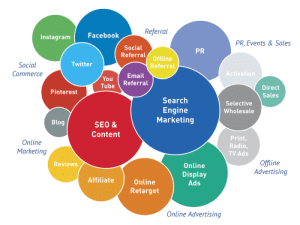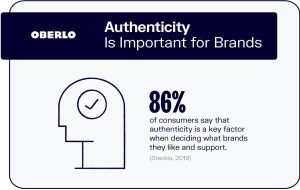
What is a Creative Agency and When Do You Need One?
If you’re not living under a rock in the branding world you’ve probably heard quite a bit about creative agencies. Maybe you’ve even heard (and eye-rolled if you’re like me) the use of “creative” (the noun) as in “he’s in charge of creative.”
Maybe you saw your old coworker from the marketing department launched her own creative agency. Maybe you’ve seen ads online promoting “creative services” for brands.
But really, what is everyone talking about?
Questionable word usage aside, creative agencies are a real thing. A really valuable resource, in fact, for the brands who need their services. The problem is that it can be hard to decipher what they actually do. Even more than that, it isn’t easy to know exactly if or when a creative agency is the right solution for your brand.
So let’s dive in. In this article we’ll cover what creative agencies really are, how they’re different from other types of agencies, how they provide value, and how to know if you need one.
Quick Takeaways
- Creative agencies take a more holistic approach to brand strategy than traditional agencies.
- Creative agencies cover a wide range of specialty areas including content, marketing, advertising, and design.
- You might need a creative agency if your in-house team needs additional expertise or resources to execute your strategy.
- One of the most valuable benefits of a creative agency is a fresh perspective.
- When looking for the right creative agency, it’s best to shop around, ask questions, and include your team in the process.
What is a Creative Agency?
Creative agencies have expertise across many disciplines. Their diverse services allow them to help brands launch comprehensive creative strategies and accomplish a wide range of goals. Creative agencies vary in their areas of specialization but typically include a combination of the following:
- Content: developing many types of content for different engagement channels, including web design, e-books, infographics, and more
- Marketing: performing market analysis and developing strategies for increasing brand awareness, generating leads, and driving sales
- Design: designing digital and print materials like websites, brand assets, advertisements and more
- Advertising: developing and launching campaigns to promote your brand and offerings through various print, digital, and other media channels
- Social Media: optimizing content and publishing schedule across social media platforms
- PR: handle strategic communications that increase brand awareness and build a strong brand reputation
- Photo/Video: providing professional photography and video services
It’s important to note that strategy guidance is a key part of the value creative agencies offer. A quality creative agency won’t just create professionally designed materials or well-written content.
Instead, they’ll partner with your brand to develop a strategy for leveraging the assets they deliver. In addition, they’ll help you identify strengths and weaknesses within your current approaches, implement creative solutions, and identify new opportunities for the future.
In short, creative agencies take a more holistic approach to brand strategy that can help you address a wider range of goals and strategies than traditional agencies with a singular focus. Here’s a great overview of how brand strategy differs from those singular areas (in this case, marketing).
How to Know When You Need One
Hiring a creative agency is typically something we see come after our smaller or startup clients have created their annual content plan with a content marketing agency like ours.
There’s no question that hiring a creative agency can be a significant investment. Before you do, you want to be sure that it’s the right solution for your company. Here are a few key indicators that your company could use the services of a creative agency:
- Expertise: Creative agencies can offer high-level expertise across a wide range of strategic areas and functions. This type of expertise is expensive and often impossible to maintain in-house.
- Experience: Creative agencies are able to create cross-discipline teams with people who already have extensive experience in their specialty area.
- Resources: Even with the right strategy in mind, companies often have limited means, availability, or access to the resources they need to execute it.
- Technology: Creative agencies are able to invest in and maintain the most up-to-date technology tools to help execute your strategy.
- Bandwidth: If your team is already stretched thin working with clients or handling other responsibilities, it can be difficult to allocate the time needed to maintain a strong brand strategy.
- Results: This one’s easy. If what you’re already doing isn’t working, it may be time to bring in a fresh perspective.
Benefits of Working with a Creative Agency
In today’s world there are so many marketing channels you can use to promote your brand that even knowing them is an accomplishment, let alone managing them. A creative agency can help you pull all the pieces together.

SEO and Content Marketing deliver nearly 80% of the traffic to company websites.
But how do you manage the other 20%? When you find a creative agency that’s a great fit for your brand (more on that later) you’ll enjoy immediate and obvious benefits that can improve your team’s experience, enhance your relationship with your customers, and drive better business results.
- Fresh Perspective: That fresh perspective we mentioned before? It’s one of the most valuable benefits of hiring a creative agency. Sometimes an outsider’s view or a new idea is exactly what your brand needs. A fresh perspective can also help spot gaps and see new opportunities that you may not have considered before.
- Saved Money: Say what?! A creative agency requires a financial investment, right? Right. But in the long run, it also means you’re optimizing your budget by allocating it where it will yield results.
- Saved Time and Resources: When you outsource brand strategy, your in-house team is able to reallocate their time to other strategic projects.
- Established Network: Whether you’re looking into influencer marketing, want to build a brand partnership, or need new media connections for a big promotion, creative agencies have established networks that
- Increased ROI: Creative agencies have the expertise, experience, and resources to implement high-quality brand strategies. As a result, you can expect to see increased ROI from your collaborative efforts. After all, their business success depends on yours.
Finding the Right Agency for You
No two creative agencies are exactly alike, and not every agency will be the right fit for your brand. So how do you know which one is? Part of it will be intuition. You should research and interview 3-5 potential agencies to get an idea of what resonates and fits best with your goals. A natural connection between your team and your agency’s can be a big part of the decision, and that’s perfectly okay.
That said, there are some specific strategies you can use to be sure you’re doing your due diligence before you hire a creative agency.
- Shop Around (Really): Don’t settle for the first agency you talk to, even if you think they’re great. After all, creative agencies are trained experts on selling their brand. Do the work and talk to a few agencies before you decide which one to hire.
- Know Your Goals: You can’t assess whether an agency can help you achieve your goals unless you know what they are. Like we already covered, creative agencies have different areas of specialty and many are better at different things. Setting goals before you hire an agency helps you find one that is best aligned with what you want to achieve.
- Ask for Previous Results: There’s no better reflection of an agency’s quality than their previous track record. Don’t be afraid to ask for examples of how they’ve helped other brands succeed. The best agencies will have these examples at the ready in the form of case studies, example materials, and customer testimonials.
- Use Recommendations: Trusted recommendations from others in your professional network can be one the best (and most efficient) ways to find potential creative agencies. People who know your brand and team are most likely to be able to recommend an agency that’s a good fit.
- Include Your Team: Partnering with a creative agency is collaborative and most likely will involve several people at your company. Be sure to include them in the vetting process to choose an agency that will work best with your team.
To really understand how essential it is to find an agency that fits with your brand, consider this: 86% of consumers say that authenticity is a key factor in deciding which brands they choose. Your creative agency must genuinely be aligned with your brand and your goals in order to build and execute a strategy that is authentic.

Enhance Your Creative Content Strategy
It’s impossible to have a strong creative brand strategy without good content. Research shows that brands that publish content frequently and consistently earn more traffic and generate more leads. But creating content at that level and speed takes time, resources, and knowledge about what kind of content converts.
Marketing Insider Group can deliver weekly content in the form of SEO-optimized blog articles. We can tackle a wide variety of content needs, too, including e-books, case studies, infographics and more. Our Content Builder Services include a full SEO audit of your current content and an annual editorial plan.
Schedule a free consultation today to learn more!






